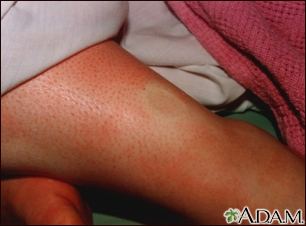Courtney and the Cancer She Never Planned For
Courtney has always been a planner, even as a child. Growing up in Gainesville, she produced pretend weddings for her sister and neighborhood friends, ensuring…

Update your location to show providers, locations, and services closest to you.
Swelling is the enlargement of organs, skin, or other body parts. It is caused by a buildup of fluid in the tissues. The extra fluid can lead to a rapid increase in weight over a short period of time (days to weeks).
Swelling can occur all over the body (generalized) or only in one part of the body (localized).
Edema; Anasarca
Slight swelling (edema) of the lower legs is common in warm summer months, especially if a person has been standing or walking a lot.
General swelling, or massive edema (also called anasarca), is a common sign in people who are very sick. Although slight edema may be hard to detect, a large amount of swelling is very obvious.
Edema is described as pitting or non-pitting.
Swelling can be caused by any of the following:
Follow your health care provider's treatment recommendations. If you have long-term swelling, ask your provider about options to prevent skin breakdown, such as:
Continue with your everyday activities. When lying down, keep your arms and legs above your heart level, if possible, so the fluid can drain. DO NOT do this if you get shortness of breath. See your provider instead.
If you notice any unexplained swelling, contact your provider.
Except in emergency situations (heart failure or pulmonary edema), your provider will take your medical history and will perform a physical examination. You may be asked about the symptoms of your swelling. Questions may include when the swelling started, whether it is all over your body or just in one area, what you have tried at home to help the swelling.
Tests that may be done include:
Treatment may include avoiding salt or taking water pills (diuretics). Your fluid intake and output should be monitored, and you should be weighed daily.
Avoid alcohol if liver disease (cirrhosis or hepatitis) is causing the problem. Support hose may be recommended.

McGee S. Edema and deep vein thrombosis. In: McGee S, ed. Evidence-Based Physical Diagnosis. 4th ed. Philadelphia, PA: Elsevier; 2018:chap 56.
Swartz MH. The peripheral vascular system. In: Swartz MH, ed. Textbook of Physical Diagnosis: History and Examination. 8th ed. Philadelphia, PA: Elsevier; 2021:chap 15.
Courtney has always been a planner, even as a child. Growing up in Gainesville, she produced pretend weddings for her sister and neighborhood friends, ensuring…

Children seem to have a fascination with putting objects into their ears. Whether it’s a marble, bead, cotton swab, pencil or even a bug, objects can easily…
